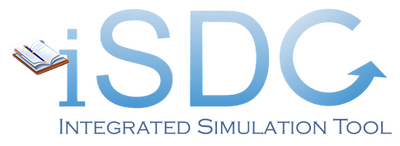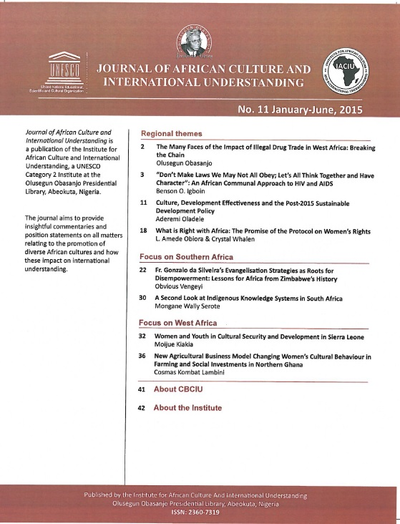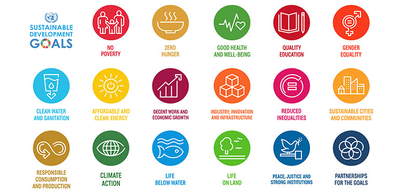Since their adoption in 2015, the Sustainable Development Goals (SDGs), which form the content of the Agenda 2030 for Sustainable Development, have continued to affirm the hopes, and potentials they portend for international development. The SDGs’ results framework and distinctive feature of a universal development agenda both in terms of multisectoral coverage and a unifying factor for the developing and developed countries, indeed promised a level of impact at the end of the 15 years implementation period.
As an international development practitioner with focus on Africa, one of my preoccupations of recent has been of what particular advantage are the SDGs for the continent. Thus, I visited this question in a research paper currently being reviewed for publication, by examining the susceptible changes the Agenda 2030 is bringing to the ebbs and flows of international development. The main thesis of the research is that the SDGs represent both challenges and opportunity for international development, while for Africa this challenge lies in moving from the conventional and business-as-usual approach into a new level of operation to enhance ownership, democracy, leadership, governance, institutional and data management which could finally unleash the continent for sustainable development. A section of my arguments in that respect is what I will share in this article.
For a background, the Agenda 2030 for sustainable Development is a universally agreed international development policy adopted under the auspices of the United Nations in September, 2015. It is a set of 17 goals, referred to as the Sustainable Development Goals (SDGs), 169 targets and about 230 indicators, which constitute a game-changing “results framework” and an agenda with a universal outlook, as opposed to earlier Internationally Agreed Development Goals (IADGs), particularly the predecessor Millennium Development Goals (MDGs), implemented from year 2000 to 2015. The SDGs also came with an objective of “leaving no one behind”, a political imperative, linked to the concept of universality, which tends to close the margins between developing and developed countries in the applicability of the goals, a dichotomy perceived as a failing in the globalist feature of the preceding MDGs.
The SDGs vision, which of course is an improvement on the MDGs, is to eradicate extreme poverty, reduce inequalities, take action to mitigate climate change and ensure peace, security and human prosperity by 2030. Its ambitious results framework represents a strategy that will work, but, in the general view, this success would depend largely on measures of change and the ability for all countries and institutions to embark on reforms, innovation and investments that will shift focus from the conventional approach to “outside-of-the-box” thinking and action.
We have for the first time in the SDGs, a development policy framework that took into consideration, in its initial and proper composition, the intertwining of development challenges, where simultaneous actions in different sectors of international and country-wise political economy are realigned and deliberately fused to facilitate delivery-as-one. There is therefore no doubt that the 17 goals, covering poverty eradication, education, environment, peace and security, climate change, food security, partnership for development, leadership and democracy, and the rest of them, were not only articulated with respect for the principle of results based management, they were also dotted with sound monitoring and evaluation frameworks that guarantee assessable impact.
In that regard, African countries with an history of troubling institutional effectiveness, results-focused, democracy and development ownership with a strong need for constant assistance in streamlining process and outcome, would benefit from the provision of the SDGs if the countries are ready to innovate and invest rightly but far from the conventional.
For all it’s worth, the buzzword, Africa out-of-the-box, is taken in the context of the desired “rupture from the so-called conventional approach” by African states to development actions. Mike Sturm once wrote that “among the most well-worn phrases in the business world is “thinking outside the box”, which is supposed to mean thinking creatively, freely, and off the beaten path”. This rupture also suggests a deliberate attempt to desist from an African business-as-usual phenomenon, well-articulated by the French phrase “plus ça change, plus c’est la meme chose”. The term emphasizes the predominant record of persistent “little change for greater efforts” in Africa’s development landscape. Issues such as over dependent on precedence, lack of initiative and lack of political will and institutional responsibility, have engendered in Africa some so-called boxes, caging its development progress. These boxes are hinged on approaches, mentalities, systemic inadequacies and a complacent posture, which tend to defile remedies, particularly when coupled with issues of corruption and institutional inefficiency.
Yet, if Africa must take full advantage of the SDGs potentials and harness it for positive results and impact come 2030, thinking outside these boxes is inevitable. The enormous potentials inherent in the Africa emergence will be properly anchored for auto development, if the required ingredients of thinking, investing and innovating out of the boxes for the SDGs implementation are quickly identified and deployed. I am touching on investing and innovating for ownership, governance and results culture; as well as data availability and management for a successful SDGs implementation in Africa. These are indeed essential in more ways that one for an Agenda 2030 that serves Africa right. And for which creativity, financial and human investment, as well as ad-hoc alliances will be required as a matter of urgency.
Innovation for Ownership, Governance and Results Culture for a Renewed Africa
Let me recall here the ample opportunity the transition from the Millennium Development Goals (MDGs) to the Agenda 2030 for Sustainable Development presents to the Africa’s renewal agenda. The MDGs, despite their global outlook, was a wake-up call to ownership by African States and are at the origin of reforms at the regional level of the African Union Commission. It was also the motivation behind the Africa’s renewal move which culminated in the establishment of the New Partnership for Africa’s Development (NEPAD) at the wake of the millennium. In the same vein, the quest for aid effectiveness to reinforce the implementation of the MDGs indeed popularized ownership and results-based approach in Africa. As continuity in this trend, the Agenda 2030 for sustainable development as a results framework its embodiment of reinforcing institutions for effective implementation presents an opportunity for solutions to Africa’s development deadlocks which still manifest in ineffective institutions and lack of political will.
From post-independence Africa to the late 1990s, dependency on development “aid and assistance as well as reforms without significant change have been a strong part of the African story. However, the adoption of the MDGs in the year 2000 was a big departure from the “begging bowl politics” when the issue of ownership and equal partnership by Africa and the West were brought to the table and there was a clear engagement by African leaders to own their development trajectories. By this engagement and the series of actions and institutional arrangements that followed, Africa’s renewal, drawing on efforts to renew the interplay of economic, politics and institutional arrangements to change Africa’s fortune with the active participation of Africans and African leaders came to the fore. It is taken therefore that the political-economy of Africa’s renewal dwells first on the issue of ownership, whereby there were renewed engagements by African Governments to take their destinies into their own hands at the aftermath of the adoption of the MDGs, while the embrace of a “results culture, Africa emergence and institutional reforms for aid effectiveness is dubbed the “New” Political Economy of Africa’s renewal.
The “new political-economy of Africa’s renewal” focuses on innovation and review of criteria for measuring results to increase the impacts of development actions to leverage the present economic growth potentials and emergence as a new investment destination.
Looking at progress since the MDGs implementation and the present offerings of the Agenda 2030 for Sustainable Development which come with a rectification of “leaving no one behind”, as well as a results framework that leaves room for reforms to meet the heights of objectives, targets and indicators, the SDGs are poised to be an accelerator for the so-called new political-economy of Africa renewal. This is also in the sense that, reinforcing institutional effectiveness is integrated as a standalone goal, the necessity of reform for an integrated development policy that covers all sectors, which will necessitate “programme nexus” across board rather than strict administrative and management procedures, will improve on the Africa’s status quo to match the economic emergence. Africa achieved remarkable economic growth performance of about 5.0 percent between 2001 and 2010 – a development which made it possible for twenty six countries to be classified as middle-income countries in 2016, against just nine in 2000.
These features characterize African as a new and “emerging” investment destination with a better future, but great efforts for institutional renewal, “ownership” and “results culture” as new focus for renewal will be strengthened in the process of the SDGs implementation if African Governments invent new ways of tackling political will and are ready to invest in creating alliances rather than linear hierarchical action focus. The innovation should de-emphasize politics and give priority to progressive policies citizenship-focused actions for alternative solution to governance.
Flashlight on Political Process, Ideology and Development Results
To consolidate this, another crucial area of investment and innovation should be that of political formation and ideology in the democratic process. In the quest for improved policy-based governance and effective leadership in Africa, through which development are channelled, this particular issue is presently the subject of a research by our think tank, 3psmars International, of which results will be published very soon. The research spanned five years of observation and analysis of trends across Africa with a special focus on the governance cycle in Nigeria, as well as the evolution of relationship between political parties, political leadership and the interplay of ideology in the process. One of the main findings is that political parties, political process and the ensuing leadership in Africa have undergone a gradual divorce from sound ideological systems across countries. Party choices by a large cross-section of leaders are no longer based on genuine development agendas, but personal interests, nepotism, clientelism and corruption. As such, irascible cross-carpeting with blatant neglect for integrity and citizenry interest are rampant, as in the case of Nigeria from the electioneering process before the 2015 elections to present.
It is noted that this phenomenon is presently affecting the quality of leadership, commitment and yielding dividends of lack of policy focus by political leaders and, consequently, lack of desired results in governance from the most crucial quarters and, consequently, overall sustainable development.
Indeed SDG 16 addresses this menace by advancing the promotion of peaceful and inclusive societies for sustainable development provide access to justice for all and build effective, accountable and inclusive institutions at all levels. Going by the SDGs universal nature, it could be said that Goal 16, although applies to all countries that are signatory to the Agenda, 2030, one would not be mincing its words by saying that the standalone Goal 16 would benefit Africa states with peculiar cases of institutional deficiency, more than any other region. The case of political parties and party politics and politicians as indispensable institutions and institutional mechanism form part of those addressed by SDG 16. It must therefore be noted that this particular goal is in fact more important for Africa than any other region.
It appears however, that despite many research findings and recommendations to revisit the issue of political ideology and its importance to quality governance and progressive development policies and action, African governments have invested so little resources towards its revitalization. It cannot be overemphasized that for the SDGs to have the desired impact, innovations such as building a new structure and functioning for political parties through renewed human and financial capacities will be required. Innovation in finding new ways of breeding a new generation of political leadership is in this wise also a requirement. All these will of course come through alternative actions requiring out-of-the-box thinking.
Investing and Innovating for Data Management
According to a “2017 Africa Sustainable Development Report: Tracking Progress on Agenda 2063 and the Sustainable Development Goals” by the United Nations Economic Commission for Africa (UNECA), in collaboration with the African Development Bank, the African Union, and the United Nations Development Program (UNDP). According to the report, “approximately six out of every ten SDG indicators cannot be tracked in Africa due to severe data limitations. Strengthening statistical systems in Africa is an imperative for successful implementation of the SDGs and Agenda 2063 as it underpins evidence based policy making. Disaggregated data by age, gender, income and geographical location is necessary to better target support to groups at risk of being left behind in the development process.
The report explored the progress the African continent has made towards the SDGs while identifying the data gaps facing policymakers and implementers and concludes that in many areas, especially in health, where data is more available, Africa is making progress. This is while 62 percent of the 232 indicators that measure performance towards the 17 Goals are not traceable in Africa due to severe data limitations.
While noting that only 12 of the 54 countries in Africa have autonomous statistics offices, the report attributes the poor availability of data to inefficiencies at the local statistics collecting agencies. National statistics offices are often plagued by insufficient funding and a lack of autonomy. The quality of data, where they are available is another challenge.
On the positive note, however, Africa may have been making more progress than recorded or reported to date, while in the more alarming negative side, the lack of data or its poor quality would remain an impediment to progress, as assessments are difficult and action orientation limited in focus. The situation also debars policy makers from pointing areas of improvement, which ultimately may lead to slow progress or lack of progress at all. The conclusion is that for Africa, tracking SDGs and Agenda 2063 progress is presently a challenge due to data limitation.
Thus, data availability and the pursuit of progress in this regard must be a priority as this will boost the achievement of the SDGs in two ways – establishing proofs of progress and improving on policies based on informed decision. Indeed, identify specific gaps will make a country’s progress towards achieving the SDGs even more successful. It is therefore predictable that the pursuit of capacity building actions for SDGs implementation should be more oriented, inter alia, to innovation and investment in institutional mechanism, manpower and partnerships for improved data collection. In so doing, new technologies, such as artificial intelligence and robotics should be deployed. This, in fact, with the state of development in Africa, needs to be embraced with immediate effect despite the long road to the possibility of its local development with autonomy. This working backward cannot be embraced from within the box, but outside of it.
Lastly, in the studies of scenario for sustainable development, orientation towards ad-hoc alliances to solve the most pressing problems through multi-stakeholder partnerships is palpable. It is not surprising that Goal 17 addresses this issue of partnership for the SDGs, thus, for Africa, the positive trend we have witness already, of development not uniquely tied to state affairs but a combination of public, private, non-governmental and civil society actions, should continue to grow. This should also not only be limited to sectoral and programmatic involvements by non-state actors, but also institutional and systemic issues that are essential ingredients for achieving impacts in all areas of development endeavours.
I should close by drawing attention to our initiative for the Agenda 2030 on this platform (3psmars International). Established in 2014, the organization is an international alliance for development effectiveness with a medium term objectives of contribution to the implementation of the SDGs through advocacy within the framework of SDGs 16 and 17. I take the opportunity to invite you to be part of this growing think tank, so you can contribute your quota of knowledge sharing and mutual exchange through this innovative alliance. Please visit our homepage (wwww.3psmars.org ) to register and have the opportunity to become a pioneering member of this futuristic think tank.
Cover Photo: (Copyright @ Land Portal and Africa development Bank Group)





